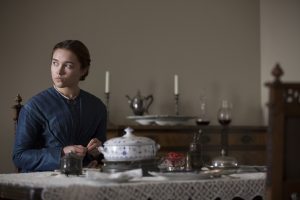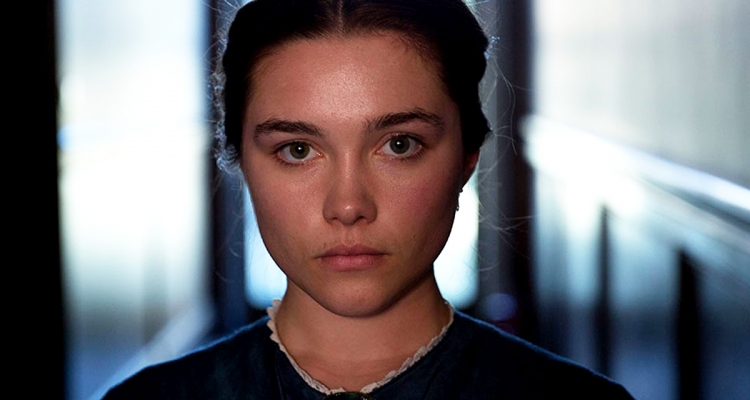If you don’t recognize Florence Pugh‘s name now, you can bet within the next year or two you will. The 21-year-old actress has been earning rave reviews for her breakout role in William Oldroyd’s adaptation of “Lady Macbeth of the Mtsensk District” by Nikolai Leskov since it premiered at the 2016 Toronto Film Festival. Pugh has the onscreen charisma and public candor of a British Jennifer Lawrence (all in the best way possible) and has already filmed Stephen Merchant’s wrestling flick “Fighting With My Family” opposite Dwayne “The Rock” Johnson and Lena Headey.
In screenwriter Alice Birch‘s modified interpretation of Leskov’s opera, Pugh portrays Katherine, a young woman forced into marrying an older, wealthy farm owner in mid-19th century England. When her husband goes away on a business trip, she becomes enamored with one of the estate workers, Sebastian (Cosmo Jarvis), much to the dismay of her housemaid, Anna (Naomi Ackie). Eventually, Katherine and Sebastian become involved in a seemingly passionate affair while trying to keep it a secret from her husband, the rest of the household and neighboring town. When it becomes obvious that her adultery may come to light, Katherine is forced to take drastic matters to protect herself.
Pugh took some time last week to jump on the phone and talk about “Lady Macbeth,” her training on “Fighting” and her love of another female wrestling endeavor, Netflix’s “Glow.”
Warning: There are some spoilers ahead if you have not read up on “Lady Macbeth of the Mtsensk District.”
—–
Gregory Ellwood: Hi Florence how are you doing?
Florence Pugh: I’m good, thank you. How are you?
Pretty good. Are you in the UK?
I’m in L.A. at the moment.
Oh, good. I’m not ruining your Friday night somewhere in…
No, no, don’t worry. You’re not calling me and I’m in a club somewhere. You’re all fine.
Exactly. Well, first of all, congratulations. So, I saw most of “Lady Macbeth” at Toronto and at the time…
Wow, you’ve been waiting a while, then.
I know, but I felt bad. I went to check it out at the festival because a lot of people didn’t know about it at the time. It was a little under the radar.
Yeah.
But had to leave because I had an assignment somewhere else. I was always so frustrated that I never saw the final 15 minutes.
No! You missed the final bit.

I know, but I’ve been raving about what I had seen until then. And now I can finally chat with you since I finally got to see the whole thing. So, obvious question first: how did the project come your way?
Shaheen Baig, who was the casting director on “Lady Macbeth” cast me in my first film, and I always trust all of the work that she sends my way. Basically, it just came in like a normal audition. It wasn’t like Will had seen stuff and wanted me to be in the film. I went in to the audition and I had a day’s notice to prepare. I thought it was Shakespeare. I was freaking out because I had a day to [learn] Shakespeare. I thought it was so unfair and I wasn’t going to get it. Then [when I got the sides I] thought it was a bit of a weird version of Shakespeare. I went into the room and I thought it went awfully. I thought I definitely didn’t get the job. I think there was just extra pressure because even with the three scenes that I got I was so in love with her already. So, I was just paranoid that I wasn’t right. Then about two days later, I got an email saying that Will wants to meet me again, and then basically, I met him again and again and again. Then we had a Skype, and then we had a chemistry read, and then shortly after that, I got the role.
You probably thought the same thing I did, or most people immediately think when they see the title that it’s based on “Macbeth” but it’s actually based on an opera. Did Will want you to either read the original opera or see videos of it? How did he want you to take that into context?
I didn’t read “Lady Macbeth of the Mtsensk,” the opera, not because I was being lazy because when I got through with the [it] was already there. The script had been written by Alice Birch, and we were doing a different version with a different ending. I didn’t really feel the need to go and read another story that we weren’t doing. Do you know what I mean? I just wanted to study the one story that we were doing. I think most of the time when you feel the need to read up on other stuff, it’s because you haven’t got enough context in front of you, but I did. I had so much. I had so much of what Alice had written. Then, obviously, I had Skyped with Will so many times that where, by the time we came ’round to filming, I was so in the know of who I needed to be and how I needed to play her. Most of my preparation was just being up in Devon [a county in southwest England] two weeks beforehand just figuring things out.
Did Alice or Will tell you what they were going for by changing the ending? At the end of the film did they tell you where they wanted the character to be? What they wanted to say?
Yes, I mean, even if they didn’t tell me the ending was quite obvious to me. It was that she’s stuck in the same situation that she was in at the beginning. I think that’s one of the beauties of the way that Alice finished this version was that [Katherine] does get away with it, but does she? She ends up in a house all alone, which is essentially what she was doing before she killed everyone. But this time, she’s pushed everyone away, and she’s still in this prison. She’s still in this home that isn’t very homely. I think the reason why Alice and Will didn’t want to do the original [ending] was because in that version Katherine doesn’t finish on such a strong note. She follows Anna and Sebastian across the world and she throws herself overboard with Anna to kill both of them together. Of course, even though that’s quite a cool shot, going into the sea, that doesn’t make Katherine very powerful. If anything, that means that she’s weaker. She cares more about someone shacking up with Sebastian than she does about herself. I think the powerful thing about our version is that she kind of wins, and she loses at the same time. But, refuses to accept that she’s lost.
In your mind, what makes her become someone who just wants to rebel and live her life into someone who’s willing to kill for it? Where’s the jump in her character?
Lots of people have asked me why I don’t think she’s a villain. I don’t think she’s a villain because I believe that she is quite simply dealing with the situation that she’s put [in]. We don’t know where she’s come from. We don’t know her backstory. She’s sold with a piece of land, and she’s treated horrendously. So, when she has the option to hurt these people that she doesn’t care about, I think that’s why we all applaud her. I think that’s why we all want her to do it, because what loyalty does she owe to any of these people? And, at what point did anybody ask her what she wanted? No one. I think that’s why I found justification in the things that she does. Breaking it down, you have to understand why your character is doing things. I’ve always understood why she is doing it. I think she does it because she’s trying to fight for her freedom. She’s fighting someone to give her some affection. I always found it quite interesting that the first person to tell her that she’s beautiful or the first person to actually show that they like her is [the young boy] Teddy, which isn’t her husband and it isn’t her lover. Ultimately, I don’t think she’s doing it because she’s evil or because she’s a villain. I think she’s just quite simply fighting for something that she should already own, which is her life, actually.


